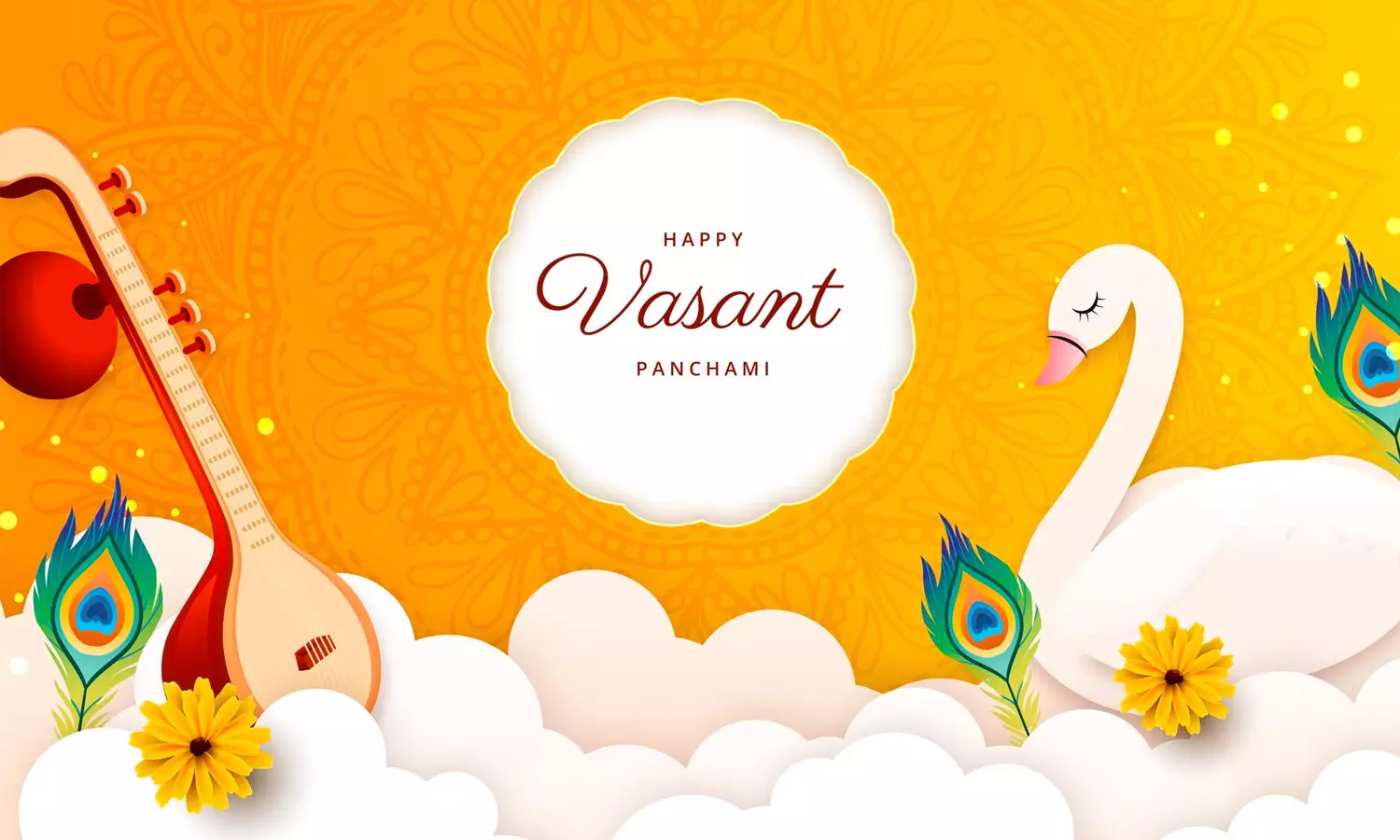Vasant Panchami 2024: Why do we celebrate Vasant Panchami?

Vasant Panchami 2024: Why do we celebrate Vasant Panchami?
Basant Panchami, also known as Saraswati Puja, commemorates the start of the spring festival. The festival is held at the end of the Magha month, which is typically between the end of January and the beginning of February. According to Hindu mythology, the universe was created on this day by Lord Brahma. Basant Panchami will be celebrated on February 14, 2024.
सरस्वति नमस्तुभ्यं वरदे कामरूपिणि । विद्यारम्भं करिष्यामि सिद्धिर्भवतु मे सदा ॥
Celebrations in India are centered on unity and harmony. Indeed, the enjoyment and merriment of the event would be woefully inadequate in the absence of delectable fare and joy.
The festival of Basant Panchami has arrived in conjunction with the arrival of spring. Mostly observed as Saraswati Puja in eastern India, specifically in West Bengal and Bihar. In contrast, Jasmine garland-wearing is an integral part of the festivities in Rajasthan, whereas in North India, particularly in Punjab, Basant Panchami is observed as a kite festival.
Additionally, Panchami signifies the onset of springtime in Hinduism. It occurs on the fifth day of the Magha maas (month), as per the Hindu calendar. On this day, according to Hindu mythology, Lord Brahma is said to have created the universe. In certain regions of the country, Saraswati Puja is also observed due to the belief that Goddess Saraswati was born to Goddess Durga on this day.
Our observance of Basant Panchami is rooted in a fascinating historical narrative. Saraswati, the goddess of learning, music, and art, is said to have been born on this day, according to a popular belief; those who wish to attain wisdom venerate her. Thus, on Basant Panchami, individuals frequently observe the Saraswati Puja.
This festival is additionally observed in academic institutions such as colleges and universities. It is said that Goddess Saraswati, who is regarded as the epitome of wisdom, can bestow upon her devotees an abundance of learning, understanding, and wisdom. An assortment of musical and dance performances is orchestrated in an effort to appease the goddess of knowledge, while both students and faculty members don new attire and offer her prayers.
In Hindu culture, Basant Panchami is highly significant. The day is regarded as exceptionally favourable for undertaking new endeavours, matrimonial unions, and housewarming ceremonies (griha pravesh). Considered a momentous occasion, the harvest of mustard crops bearing yellow blossoms, the preferred hue of Goddess Saraswati, is signified by the colour yellow during the observance of Vasant Panchami. As a consequence, adherents of Saraswati exhibit yellow garments. Additionally, in observance of the festival, a traditional feast is curated, featuring dishes that are customarily vibrant in hue with saffron.
Yellow is the symbolic colour of Basant, representing virtues such as light, energy, peace, and optimism. People wear yellow clothing and prepare traditional delicacies in yellow to reflect this. Boundisi and ladoo are presented to the goddess Saraswati in Bengal and Bihar. On this occasion, sweet rice seasoned with saffron and dried fruits is prepared in nearly every household. In addition, baer, shriphal (coconut), and mango wood are presented, with Bengalis being particularly fond of the latter. In Punjab, Maake ki Roti and Sarso Ka Saag are customarily relished. Saraswati Puja is observed in Bihar through the presentation of delicacies such as Kheer, Malpua, and Bundi to the goddess. Similar to other festive occasions, this one is adorned with an abundance of traditional delicacies. Among them are kesar halwa, kesari bhaat, payesh, begun bhaja, sondesh, and rajbhog, which are all served as bhogs on this momentous occasion. Murti Visthapan Day is observed with grand processions. Maa Saraswati's idols are serenely submerged in the sacred water of the Ganga River. In observance of this Basant Panchami, Dahi Chura is enjoyed with gur and banana.








